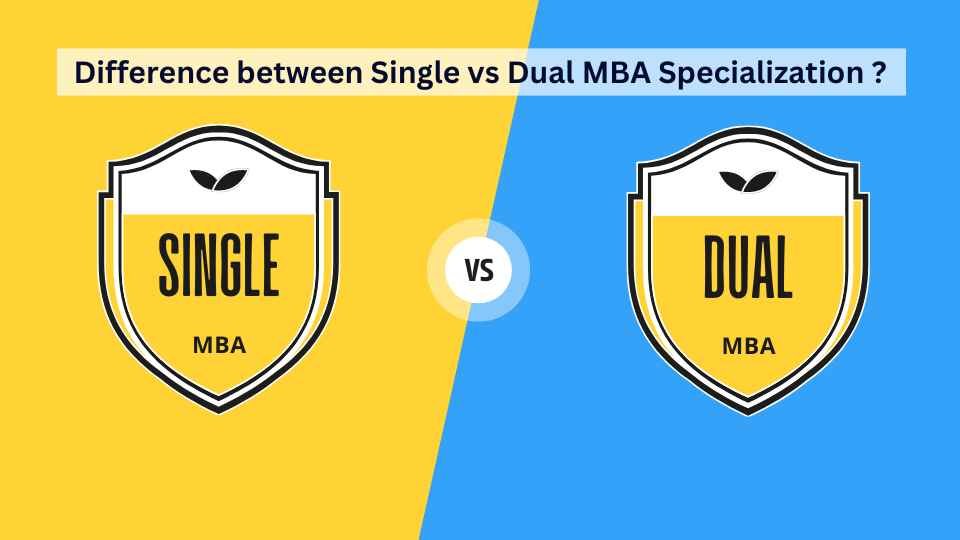The article compares the pros and cons of pursuing a Single MBA Specialization or a Dual MBA Specialization. It helps readers decide based on their career goals, interests, and circumstances.
Pursuing an MBA is a significant career decision that can open new professional avenues. One critical choice MBA aspirants face is whether to opt for a single or dual specialization program. This decision can significantly impact your learning, career prospects, and long-term goals. In this comprehensive guide, we’ll explore the pros and cons of each option to help you make an informed decision.
What is a Single MBA Specialization?
A single MBA specialization program focuses on one specific business area, such as finance, marketing, operations, or human resources. This concentrated approach allows you to develop in-depth knowledge and expertise in your chosen field. Single specialization programs are designed for students who clearly understand their career aspirations and wish to become subject matter experts.
Advantages of a Single MBA Specialization
| Benefit | Description |
|---|---|
| Focused Learning | A single specialization allows for a deeper exploration of your chosen domain, resulting in comprehensive knowledge and practical skills. |
| Industry-Specific Expertise | Concentrating on one area enables the development of specialized expertise highly valued by employers within that particular industry. |
| Targeted Career Path | Aligning your MBA with a specific specialization facilitates a smoother transition into your desired career trajectory. |
| Efficient Time Management | With a single focus, you can allocate more time and effort to mastering the concepts and techniques relevant to your specialization, enhancing efficiency. |
What is a Dual MBA Specialization?
A dual MBA specialization program allows you to explore two distinct business areas simultaneously. This approach combines core MBA courses with specialized electives from two different concentrations. Dual specializations cater to students with diverse interests or wish to broaden their career options.
Advantages of a Dual MBA Specialization
| Benefit | Description |
|---|---|
| Versatility | A dual specialization provides knowledge and skills from two domains, enhancing versatility and adaptability in the job market. |
| Broader Perspective | Studying two distinct areas offers a more well-rounded understanding of business operations and fosters a holistic approach to problem-solving. |
| Expanded Career Options | Expertise in two fields opens up various career opportunities and allows for the potential combination of both specializations in unique roles. |
| Marketability | Candidates with diverse skill sets are often highly valued by employers, making dual specialization graduates more attractive and marketable in the job market. |
The Need for a Dual MBA Specialization
While a single specialization can be advantageous for focused career paths, a dual specialization may be beneficial in specific scenarios:
- Diverse Interests: A dual specialization provides flexibility if you have multiple professional interests or are unsure about your long-term career goals.
- Interdisciplinary Roles: Some jobs require a mix of skills from different business areas. A dual specialization is valuable for these roles.
- Career Changes: A dual specialization can make career transitions smoother. It gives you complementary knowledge and skills.
- Entrepreneurship: For aspiring entrepreneurs, a dual specialization offers a broad understanding of business functions. This is essential for managing a successful venture.
Potential Drawbacks of a Dual MBA Specialization
While a dual specialization offers advantages, it’s essential to consider the potential drawbacks:
1. Increased Workload: Pursuing two specializations simultaneously can be more demanding and time-consuming than a single specialization program.
2. Diluted Focus: Dividing your attention between two areas may result in a less in-depth understanding of each specialization than a single focus.
3. Longer Program Duration: Some dual specialization programs may require additional coursework, extending the overall program duration and associated costs.
4. Limited Availability: Not all MBA programs offer dual specialization options, which may limit your choices or require you to attend a specific institution.
Difference between Single vs Dual MBA Specialization ?
The main difference between a dual MBA specialization and a single specialization is indeed the breadth and depth of knowledge acquired. A dual specialization allows students to gain expertise in two distinct areas, providing a broader perspective and skillset. In contrast, a single specialization typically offers deeper knowledge within a specific domain.

| Aspect | Single Specialization | Dual Specialization |
|---|---|---|
| Focus | Concentrates on developing comprehensive expertise in one specific business area, allowing for in-depth knowledge and focused career preparation. | Combines two distinct business areas, providing a broader skill set and increased versatility but potentially sacrificing depth in each specialization. |
| Depth of Knowledge | Offers deep knowledge and understanding within the chosen specialization, enabling mastery of concepts and techniques relevant to that specific field. | Provides a broad understanding across two areas, which may limit the depth of knowledge compared to a single specialization. |
| Career Preparation | Prepares students for a focused career trajectory aligned with the chosen specialization, facilitating smoother transitions into specific roles within an industry. | Offers versatility in career options by equipping students with skills from two distinct areas, allowing for flexibility in pursuing diverse career paths. |
| Skill Versatility | Emphasizes specialized skills tailored to one area, which may limit versatility but enhances expertise in that particular domain. | Provides a broader skill set spanning two areas, enhancing versatility and adaptability in various roles and industries. |
Our Advice: Choosing the Right MBA Specialization
When deciding between a single or dual MBA specialization, consider the following factors:
| Point | Description |
|---|---|
| 1. Career Goals | Evaluate your long-term career aspirations and determine whether a focused or versatile approach aligns better with your objectives. |
| 2. Professional Experience | If you have prior work experience in a specific field, a single specialization in that area can further enhance your expertise. A dual specialization may provide more flexibility if you’re seeking a career change. |
| 3. Time and Financial Considerations | Dual specializations may require additional time and financial resources, so assess your ability to commit to a potentially longer program duration. |
| 4. Personal Interests and Strengths | Reflect on your interests, aptitudes, and strengths to identify the areas where you can excel and find fulfillment. |
| 5. Program Reputation and Accreditation | Research the reputation and accreditation of the MBA programs you’re considering to ensure you receive a high-quality education. |
Pro Tip: Showcasing Your MBA Specialization in Your CV
Whether you choose a single or dual specialization, effectively showcasing your MBA credentials on your resume or CV is crucial. Here’s how:
| Point | Description |
|---|---|
| 1. Single Specialization | Clearly state your MBA specialization, such as “MBA in Finance” or “MBA in Marketing.” |
| 2. Dual Specialization | Mention both specializations, for example, “MBA with a dual specialization in Finance and Marketing.” |
| 3. Highlight Relevant Coursework | If you’ve taken particularly relevant or specialized courses within your specialization(s), consider highlighting them to demonstrate your specific expertise. |
| 4. Emphasize Practical Experience | Include any internships, projects, or real-world experiences you gained during your MBA that align with your specialization(s). |
| 5. Tailor Your CV | When applying for specific roles, tailor your CV to highlight the specialization most relevant to your desired position. |
Other Types of MBA Programs
While single and dual specializations are common, some MBA programs offer alternative formats:
1. General MBA: This program provides a broad overview of various business disciplines without a specific specialization.
2. Executive MBA (EMBA): Designed for experienced professionals, an EMBA typically focuses on leadership, strategy, and executive-level decision-making.
3. Online or Part-Time MBA: These flexible programs cater to working professionals who prefer a more convenient and self-paced learning experience.
4. Joint or Dual Degree Programs: Some institutions offer the opportunity to pursue an MBA with another degree, such as a Master’s in Engineering, Law, or Public Policy.
FAQs (Frequently Asked Questions)
Can I change my specialization after starting an MBA program?
While changing your specialization at some institutions is possible, the process and requirements vary. You must check with your program administrators and understand the implications, such as potential delays or additional coursework.
Do employers prefer dual specialization over single specialization?
Employer preferences can vary based on the industry, role, and specific job requirements. While some employers value the versatility of a dual specialization, others may prioritize in-depth expertise in a single area.
Can I pursue a dual specialization if my undergraduate degree is in a different field?
Yes, most MBA programs accept students from diverse academic backgrounds. However, you may need to fulfill specific prerequisite courses or demonstrate relevant work experience.
Is a dual specialization more expensive than a single specialization?
Sometimes, dual specialization programs may have higher tuition fees or require additional coursework, increasing the overall cost. It’s essential to research and compare program costs before making a decision.
Can I complete a dual specialization through an online or part-time MBA program?
Many reputable online and part-time MBA programs offer dual specialization options, providing flexibility for working professionals or those with other commitments.
Conclusion
Choosing between a single or dual MBA specialization is a personal decision that should align with your career goals, interests, and circumstances. By carefully weighing the pros and cons of each option and considering factors such as workload, depth of knowledge, and career aspirations, you can make an informed choice that will maximize the value of your MBA education and set you on the path to professional success.

Lovepreet Sachdeva is an SEO Specialist with extensive experience in helping businesses improve their online presence. He is dedicated to providing top-notch SEO services and personalized strategies to boost your website’s performance. Contact him today for professional SEO assistance.


